|
|
|
Sort Order |
|
|
|
Items / Page
|
|
|
|
|
|
|
| Srl | Item |
| 1 |
ID:
174214
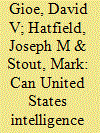

|
|
|
|
|
| Summary/Abstract |
This article argues that United States Intelligence Community analysts can and should periodically telework as routine professional development and as a research supplement to traditional all-source intelligence analysis. We offer four key benefits to tapping into this reservoir of unclassified information that would improve the quality of the intelligence product, enable better liaison and academic exchange, and steward the profession. We conclude that an overdue rebalancing of classified and publicly available sources could be aided by telework, but only once analysts break free from ‘the cult of the SCIF’ will publicly available information receive the analytical attention that it deserves.
|
|
|
|
|
|
|
|
|
|
|
|
|
|
|
|
| 2 |
ID:
161529
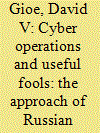

|
|
|
|
|
| Summary/Abstract |
This article argues that Russian intelligence has achieved recent success in influencing democratic elections and referenda by combining the traditional Human Intelligence (HUMINT) discipline of manipulating useful fools with cutting edge cyber tactics, including hacking, phishing, social engineering, and weaponizing purloined information. This essay further argues that this synthesis yields greater effects than the sum of its parts. Given its potency, democracies and NATO members should expect to confront this type of threat more often. The 2016 American presidential election is used as a case study to conceptualize Russian hybrid intelligence, a new term reminiscent of Soviet ‘complex active measures’ and updated for the twenty-first century.
|
|
|
|
|
|
|
|
|
|
|
|
|
|
|
|
| 3 |
ID:
183525
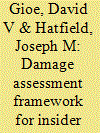

|
|
|
|
|
| Summary/Abstract |
A new ‘digital generation’ of insider threat has emerged within the US intelligence community. Edward Snowden’s mass leaks were not the first transparency-driven digital challenge to the United States Intelligence Community (USIC). Three years before, then U.S. Army Private Bradley Manning provided 500,000 classified documents to WikiLeaks, which published them to great fanfare for transparency advocates while causing much concern in Washington. These are not isolated cases; the tempo of such mass public disclosures seems to be increasing. In what ways is this new breed of insider threat akin to more traditional counterintelligence breaches such as those of the Cold War? One central point of comparison is the relative damage caused by each, since it would be difficult to sustain the thesis that a new type of insidious threat has emerged if the damage caused by mass leaks was of little consequence when compared to traditional espionage cases. And ‘damage’ must be evaluated within the social history of the breaches themselves. A systematic approach to the comparison of breaches has remained elusive. This article offers such a framework using the Snowden leak as a case study in contemporary self-tasked digital breaches and the Cambridge Five spy ring as a case study in traditional externally-tasked breaches.
|
|
|
|
|
|
|
|
|
|
|
|
|
|
|
|
| 4 |
ID:
181602
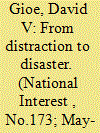

|
|
|
|
|
| Summary/Abstract |
America’s strategic distraction has favored addressing foreign threats and those domestically with a foreign aspect, leaving a wide space for domestic extremism to go unchecked.
|
|
|
|
|
|
|
|
|
|
|
|
|
|
|
|
| 5 |
ID:
174497


|
|
|
|
|
| Summary/Abstract |
This article explores how threat actors are manipulating the British information environment and provides recommendations for how the government and citizenry might defend themselves. Daniel Dobrowolski, David V Gioe and Alicia Wanless argue that enforcing heavy moderation of content is counterproductive and that civic education, transparency and ongoing research into the methods that threat actors use are essential to guide an effective response and provide original research towards this end. Through a case study approach, the article assesses two recent type-case informational threats and considers the role the UK government can play, as a model for other Western states facing similar threats, in defending against them.
|
|
|
|
|
|
|
|
|
|
|
|
|
|
|
|
| 6 |
ID:
174247
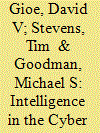

|
|
|
|
|
| Summary/Abstract |
THE EMERGENCE OF GLOBAL HYPERCONNECTIVITY through computer networks has occasioned much marvel, reflection, and commentary on its implications for everything from “just‐in‐time” supply chain management to the Internet of Things. These developments are also consequential in national security and intelligence. What must objectively be seen as technological progress has also sparked debates that would have been unimaginable half a century ago, and in fields far beyond computer and political sciences. The desire to protect informational assets from theft, subversion, and degradation and questions about how to exploit networked computing for strategic gain have spurred remarkable developments in intelligence collection, policy, doctrine, law, strategy, and even ethical norms. There are active debates about how cyber considerations affect each field touched by them, and it seems that there remain more unsettled than settled questions about cyber power as a lever of statecraft in the twenty‐first century.
|
|
|
|
|
|
|
|
|
|
|
|
|
|
|
|
| 7 |
ID:
165844


|
|
|
|
|
| Summary/Abstract |
Washington's foreign policy, which shifts from one contested region to another, does not address the underlying misalignment at the heart of U.S. foreign policy: a lack of public will and support for excessive deployments abroad, and an outdated view of evolving, contemporary challenges.
|
|
|
|
|
|
|
|
|
|
|
|
|
|
|
|
| 8 |
ID:
173649


|
|
|
| 9 |
ID:
144646


|
|
|
|
|
| Summary/Abstract |
MARK TWAIN observed, “history doesn’t repeat itself, but it does rhyme.” The study of military history teaches us valuable lessons that are applicable to today’s most intractable strategic problems; yet, these lessons are underappreciated in current American strategy formulation. Throughout the history of American armed conflict, the United States has discerned, at great cost, four critical lessons applicable to containing and combating the Islamic State.
|
|
|
|
|
|
|
|
|
|
|
|
|
|
|
|
| 10 |
ID:
127455
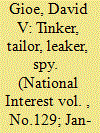

|
|
|
|
|
| Publication |
2014.
|
| Summary/Abstract |
BETWEEN THE TRIAL of Chelsea (formerly known as Bradley) Manning and the revelations of Edward Snowden, the debate regarding the leakers and their information has focused primarily on the balance between liberty and security, or between government transparency and secrecy. This is a necessary, even overdue, discussion. But it is also important to reflect upon the lasting damage these unauthorized disclosures will have on future U.S. intelligence collection.
|
|
|
|
|
|
|
|
|
|
|
|
|
|
|
|
| 11 |
ID:
165674


|
|
|
|
|
| Summary/Abstract |
The poisoning of former Russian intelligence officer and MI6 agent Sergei Skripal highlights the enduring Russian ardor for poisoning enemies of the state as a warning to others who contemplate disloyalty. Beyond treating the event itself, we explore Russian conceptions of theatrical murder as a peculiar element of state power. We historicize this development and inquire whether assassination as political theater and strategic messaging is a tool embraced in particular by Vladimir Putin or rather emblematic of the Russian state. We explore why and how Putin opted to strike at the moment he did to seek vengeance against Skripal, concluding that a confluence of structural and human factors at the intersection of British government policies with Russian domestic politics led Putin to his decision. We conclude with the implications of these findings for western governments.
|
|
|
|
|
|
|
|
|
|
|
|
|
|
|
|
|
|
|
|
|